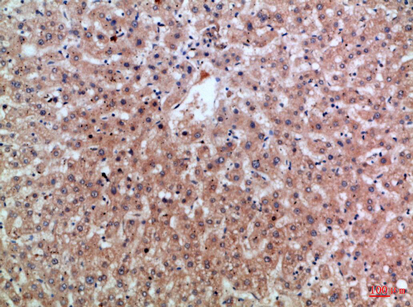Epiregulin Polyclonal Antibody
- Catalog No.:YT6045
- Applications:IHC;IF;ELISA
- Reactivity:Human;Mouse;Rat
- Target:
- Epiregulin
- Fields:
- >>MAPK signaling pathway;>>ErbB signaling pathway;>>PI3K-Akt signaling pathway;>>Colorectal cancer
- Gene Name:
- EREG
- Protein Name:
- Proepiregulin [Cleaved into: Epiregulin (EPR)]
- Human Gene Id:
- 2069
- Human Swiss Prot No:
- O14944
- Mouse Gene Id:
- 13874
- Mouse Swiss Prot No:
- Q61521
- Immunogen:
- Synthetic peptide from human protein at AA range: 71-120
- Specificity:
- The antibody detects endogenous Epiregulin
- Formulation:
- Liquid in PBS containing 50% glycerol, 0.5% BSA and 0.02% sodium azide.
- Source:
- Polyclonal, Rabbit,IgG
- Dilution:
- IHC 1:50-200, ELISA 1:10000-20000. IF 1:50-200
- Purification:
- The antibody was affinity-purified from rabbit antiserum by affinity-chromatography using epitope-specific immunogen.
- Concentration:
- 1 mg/ml
- Storage Stability:
- -15°C to -25°C/1 year(Do not lower than -25°C)
- Other Name:
- Proepiregulin [Cleaved into: Epiregulin (EPR)]
- Background:
- This gene encodes a secreted peptide hormone and member of the epidermal growth factor (EGF) family of proteins. The encoded protein is a ligand of the epidermal growth factor receptor (EGFR) and the structurally related erb-b2 receptor tyrosine kinase 4 (ERBB4). The encoded protein may be involved in a wide range of biological processes including inflammation, wound healing, oocyte maturation, and cell proliferation. Additionally, the encoded protein may promote the progression of cancers of various human tissues. [provided by RefSeq, Jul 2015],
- Function:
- function:May be a mediator of localized cell proliferation. As a mitogen it may stimulate cell proliferation and/or angiogenesis.,similarity:Contains 1 EGF-like domain.,tissue specificity:In normal adults, expressed predominantly in the placenta and peripheral blood leukocytes. High levels were detected in carcinomas of the bladder, lung, kidney and colon.,
- Subcellular Location:
- [Epiregulin]: Secreted, extracellular space .; [Proepiregulin]: Cell membrane ; Single-pass type I membrane protein .
- Expression:
- In normal adults, expressed predominantly in the placenta and peripheral blood leukocytes. High levels were detected in carcinomas of the bladder, lung, kidney and colon.
- June 19-2018
- WESTERN IMMUNOBLOTTING PROTOCOL
- June 19-2018
- IMMUNOHISTOCHEMISTRY-PARAFFIN PROTOCOL
- June 19-2018
- IMMUNOFLUORESCENCE PROTOCOL
- September 08-2020
- FLOW-CYTOMEYRT-PROTOCOL
- May 20-2022
- Cell-Based ELISA│解您多样本WB检测之困扰
- July 13-2018
- CELL-BASED-ELISA-PROTOCOL-FOR-ACETYL-PROTEIN
- July 13-2018
- CELL-BASED-ELISA-PROTOCOL-FOR-PHOSPHO-PROTEIN
- July 13-2018
- Antibody-FAQs
- Products Images

- Immunohistochemical analysis of paraffin-embedded Human-liver, antibody was diluted at 1:100



